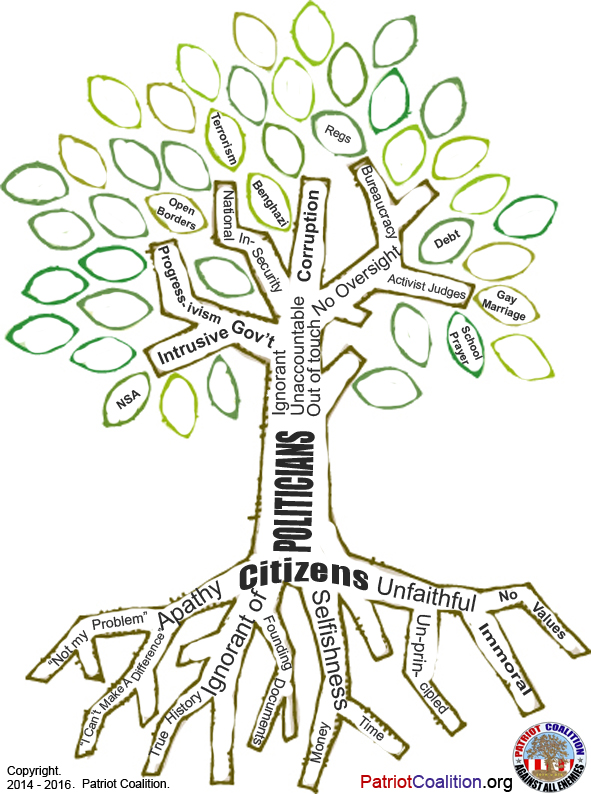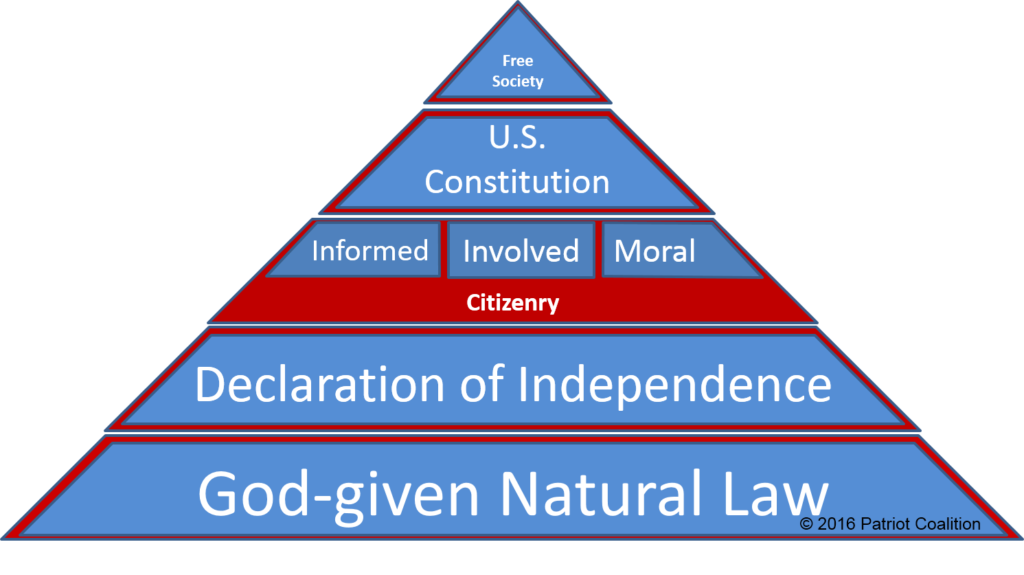Chopping at the Root
 Sometimes it is so frustrating scrolling through all of the social media out there full of the latest unbelievable act of this politician or that branch of government.
Sometimes it is so frustrating scrolling through all of the social media out there full of the latest unbelievable act of this politician or that branch of government.
It is frustrating because recounting and underscoring the wrongness of these acts, or testifying to how angry it makes you, or spending time creating memes about them does nothing to solve the problem. While sharing news stories and commentaries with your fellow citizens is important, we have far too many of these social media “pundits” out there and not enough analysts, planners, and principled leaders.
Further compounding the problem is that the “pundits” do not do their own research, but just re-post what they have already seen, further inciting the already near-riotous, pitchfork-wielding, froth-mouthed internet mob with half-vetted stories.
Imagine that all of these problems we see flying around the internet (as well as their detrimental consequences) are branches or limbs on an undesirable tree in your backyard. The branches that are growing closest to your house, powerlines, or fence are the urgent issues.
You can continue building the analogy to suit the situation, but hopefully, you get the idea! As part of this scenario, our assertion is that all of the branches are eventually connected to a root system that represents the “root” cause(s) of these problems.
Now, if you are fed up with all of these problems (branches), does it make sense to continue to swat at the limbs and break off the branches, or would it be better to identify where the root system extends and “chop at the root” of the problem?
Conviction is worthless unless it is converted into conduct.
–Thomas Carlyle
You see, that is what is so frustrating: too much hacking at branches and not enough chopping at roots. Branches are a distraction–sometimes an urgent distraction–but a distraction nonetheless. All of the time we are not chopping at the roots, they are extending, growing deeper, and seeking out new sources of nutrients to extend the life and support needed for the ever-growing size and number of branches (problems).
Break the branch of one corrupt politician and another one will grow back…
Slap away the branch full of unconstitutional legislation and more will grow back…
Saw off the limb representing the latest executive amnesty or comprehensive immigration reform and another will grow back in its place…
Rip off the thousands of leaves and twigs representing the hypocritical, immoral, and downright anti-American objectives of the progressive agenda and it will continue to surface to influence our politicians…
Unless you chop at the root!
So how do we chop at the root?
First you have to find the root(s). “That’s easy,” you might say, “just follow the branches down until it reaches the ground!” It’s the politicians, stupid!
Yes, that seems simple enough…or is it?
How many times have you heard someone say something like…”all we need to do to fix our country is to vote for this person or that party and we’ll be saved!”
Tell me, how is this strategy working out for us?
Even if we do truly find the roots, then what? How do you expose them? Destroy them? Ensure that they are completely uprooted and destroyed?
To answer questions and make decisions of this magnitude, we need a framework that will help us choose the best course(s) of action–a set of priorities and principles if you will–to guide what promises to be a long and arduous journey to ensure that our collective efforts are focused, in concert, and ultimately “chopping at the root”.
To do otherwise would only be perpetuating the status quo of “hacking at limbs”. We will come back to the framework a little later. First it is time for a healthy dose of the truth.
So, you think the root of the issue is the politicians? Think again.
The politicians are just the trunk of the tree in our analogy. Blaming the politicians for our nation’s problems is like blaming our own children for the way they turned out after years of tantrums, outbursts, and disrespectful behavior without consequences; or like blaming a company’s employees for its bankruptcy after years of poor employee performance and no change in staff.
No, the responsibility lies with each of us. After all, we are the ones responsible for electing them to office and then allowing them to stay! Collectively, and individually in most cases, we have not fulfilled our solemn duty of being good stewards of our Republic. We have failed each other!
Early in our nation’s history, President Andrew Jackson warned us about this.
President Andrew Jackson
“But you must remember, my fellow-citizens, that eternal vigilance by the people is the price of liberty, and that you must pay the price if you wish to secure the blessing. It behooves you, therefore, to be watchful in your States as well as in the Federal Government.” — Andrew Jackson, Farewell Address, March 4, 1837
In our analogy, this failure is represented by allowing the roots of “Apathy” and “Selfishness” to grow unabated. We have abdicated our individual responsibilities as the ultimate caretakers of our great nation. Either we think our efforts don’t matter or we have too many other important things to do.
If we do not accept responsibility on an individual basis for our failure to safeguard our Republic, we will continue to blame the guy in office and go on to replace him with the next guy with the “correct” letter next to their name at the ballot box. This is the same thing we have been doing for decades, and it will continue to give us the same results.
When is the last time someone you know ran for elected office; or at a minimum someone who goes through the same struggles in life as you? Someone who shares the same principles and values? Someone you know to be altruistic and true to his word?
“Ok, so I have accepted that I have not done enough to safeguard my country. What now?”
Chances are that if you are like the rest of us, for that period of time when your head was down, grinding away at life, going to school, working, raising families, and paying bills, you only picked your head up occasionally to see what was going on around your state or country. And I don’t mean just to watch the news; I mean to take extra time out of your day to dig deeper, research, make phone calls, or get materially involved in some way. It was probably when some news story broke about something that was going to affect your existence in a direct and tangible way: such as your bank account or personal safety and security.
If this is the case, then you have some catching up to do. Because unless you are staying vigilant as Jackson warns, chances are you do not have the knowledge, context, and history to effectively contribute to the cause of liberty. Thomas Jefferson had some sage words to say about this:
President Thomas Jefferson
“No nation is permitted to live in ignorance with impunity. –Thomas Jefferson to the Virginia Board of Visitors, 1821“
…and…
“I know no safe depository of the ultimate powers of the society but the people themselves; and if we think them not enlightened enough to exercise their control with a wholesome discretion, the remedy is not to take it from them, but to inform their discretion by education. This is the true corrective of abuses of constitutional power. –Thomas Jefferson in a letter to William C.Jarvis, 1820“
So, now is the time to “inform [your] discretion with education.” Start with the basics; the building blocks of our nation. Read the Declaration of Independence and the full Constitution–several times. The Founders wrote differently back then. It will take several readings to get the hang of it, but it is important. Do not read an interpretation of these documents, but the original text! Then move on to the Federalist Papers and Elliot’s Debates to understand the context of the framing of our nation. There is also some excellent context in the Records of the Federal Convention of 1787, Volume I, Volume II, and Volume III.
This introductory reading list will begin to address the “ignorance” root in our analogy, but don’t stop there. Continue to learn about how this nation was founded and designed to function. This knowledge is one of the tools you will use to restore Constitutional governance.
“But, all of this is terribly overwhelming! I have a job and kids and other activities that occupy my time. How will I ever afford to spend time on any of this?”
Let’s begin by asserting the following: we can’t afford not to spend time on this. Should we fail to devote the time, we allow the “apathy” and/or “selfishness” roots to continue to thrive, and the cycle continues ad nauseum. The good news is that you are not alone, there are millions of other Americans out there that have to play catch-up–probably as close as your next-door neighbor! It begins with one other person to help educate each other and reset our expectations of those elected officials in whom we entrust our communities, states, and nation. Iron sharpens iron!
Eventually the two of you will seek out others to share, learn, and get involved by engaging your public officials at all levels of government to “inform their discretion” and reset expectations.
Seek. Share. Learn. Engage. Repeat.
We told you it would be long and arduous! But then again, we did not get into this predicament overnight!
So, let’s get back to that framework we talked about earlier, and see if we can put all of this into perspective.
Now, we’ll make some “radical” proposals, so buckle up! (Actually, these ideas would not have been considered “radical” as recently as 65 – 70 years ago–in fact they were accepted as common-sense at the time).
Whether we know it or not, each of us uses some form of framework for making decisions in our life, both big and small. For the small ones, it is probably sub-conscious and routine so it takes little thought. For other decisions, we evaluate them based on their potential positive and negative outcomes. Furthermore, for those with what we call a “strong moral compass,” these decisions must also stand up against a test against their values, morals, and/or principles. In some cases, these outcomes, values, morals, and principles may be in conflict with one another.
For this reason, it is important to prioritize (at a high level) the things that are most important in your life to help you make these types of difficult decisions that may have conflicting priorities. Enter the first part of our decision framework–our priorities:
- God
- Family
- Country
- Self
Yes, you will notice that God is at the top. I realize this is “controversial,” but we cannot have it both ways. We cannot complain about the corruption and lack of principles, values, and morals of our politicians, only to find our own Bibles accumulating dust under the TV remote control. Where do you think the values of our nation originated?
The answer: from our Founding Fathers who were predominantly Christians and had tremendous faith in the teachings of the Holy Bible. Yes, despite the cries from the “deafening minority”, we were founded as a Christian nation. For now, let me share with you a few references to drive the point home.
President John Adams
“Our Constitution was made only for a moral and religious people. It is wholly inadequate to the government of any other. “–John Adams, Letter to Officers of the 1st Brigade, 3rd Division, Militia of Massachusetts.
“Religion, morality, and knowledge, being necessary to good government and the happiness of mankind, schools and the means of education shall forever be encouraged. ” (Northwest Ordinance of 1787, Art. 3)
The Northwest Ordinance of 1787 was one of the very first laws passed by the Continental Congress!
Dr. Benjamin Rush
“[T]he only foundation for a useful education in a republic is to be laid in Religion. Without this there can be no virtue, and without virtue there can be no liberty, and liberty is the object and life of all republican governments. “– Dr. Benjamin Rush, On the Mode of Education Proper in a Republic
Dr. Rush was one of the signers of the Declaration of Independence.
To restore the Constitutional governance we all seek, it stands to reason that we must return to those values, principles, and morals that established the most successful form of government our world has ever known. After all, ours is the only country in the history of mankind that has survived as long as it has under the same founding document.
So, we must chop at the “unfaithful” root in our analogy by returning our citizenry (and by extension the politicians we elect) to those values, morals, and principles that are derived from the Holy Bible. As you will see in the image below, our entire free society (our Constitutional Republic) is dependent on that God-given natural law and is supported by each level in between. The Declaration of Independence holds no weight if we forsake the truths given to us in the Bible. Similarly, if we do not have an informed, involved, and moral citizenry, the Constitution will do us no good (as we are witnessing today and as our Founding Fathers predicted in the various quotes above).
The Foundation of our Constitutional Republic
Finally, once our neighbors and fellow citizens have bridged the education gap, it is time for them to set out restoring Constitutional governance by engaging their elected officials and seeking candidates to replace them in the next election cycle. Every situation will be different in some aspect, so as part of our framework, the guiding principles for this phase of our mission should be as follows:
These principles must become part of our mantra when speaking with our elected officials. We must demand they choose principle over party in all cases; and we must hold them to it.
This is just the beginning, and remember:
“Conviction is worthless unless it is converted into conduct.”
If not now, then when? If not you, then who?










